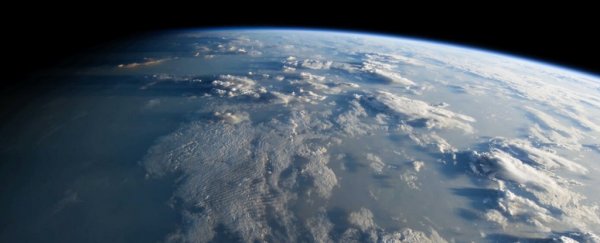It's been exactly one year since US scientists reported a mysterious surge in ozone-destroying chemicals, known as chlorofluorocarbons (CFCs).
Banned in 1987 under the globally signed Montreal Protocol, there was only one explanation: somewhere out there, in an unknown location, someone must have gone rogue, setting back progress on the ozone hole by a decade or more.
After much speculation, the whereabouts and magnitude of these harmful emissions has been confirmed in scientific research. As earlier reporting in The New York Times had already suggested, they seem to be coming from the northeast coast of mainland China.
Since the Montreal Protocol was declared a success in 2013, this highly industrial region has continued to emit, whether accidentally or not, CFC-11: the second most abundant chlorofluorocarbon in the atmosphere. Between the periods of 2008-2012 and 2014-2017, in fact, CFC-11 emissions increased here by roughly 110 percent.
"This increase accounts for a substantial fraction (at least 40 to 60 per cent) of the global rise in CFC-11 emissions," an international team of researchers writes in a new report.
"We find no evidence for a significant increase in CFC-11 emissions from any other eastern Asian countries or other regions of the world where there are available data for the detection of regional emissions."
These violations are likely going unreported because even though CFC-11 is illegal, it is also one of the cheapest ways to produce new foam insulation in refrigerators and buildings.
After tracking down documents and international sources, journalists at The New York Times and independent investigators discovered that in some factories in China, illegal CFC use has been slipping through the cracks for years.
The examples given are based in Xingfu, a rural industrial town in China's Shandong province, and incidentally, that is the very same province that the scientists landed on too.
Gathering atmospheric observations from locations in South Korea and Japan, the researchers compared global monitoring data and atmospheric chemical movements to figure out whether these emissions came from eastern Asia - the area most suspected as the source of CFC-11.
Along with Shandong, the nearby province of Hebei was also implicated. Both regions are big industrial producers heavily involved in the nation's manufacturing, and while the chemical may not actually be produced here, it's certainly being emitted at alarming rates somewhere nearby.
"To bring about such an increase … would require new emissions from the disposal and destruction of refrigerators more than 10 times higher than recently estimated for the whole of China between 2014 and 2017," the authors write, "or a larger and more rapid increase in emissions from the demolition of old buildings than was previously predicted for the entire world over a 20-year period (2020–2040)."
Whether these factories know what they're doing or not (and the NYT report certainly suggests they understand), their actions pose a serious threat not only to the ozone layer, but also to the climate crisis. CFC-11 has a powerful heat-trapping effect in the atmosphere, so if emissions continue as they are, experts say it would be equivalent to the amount of CO2 produced by 16 coal-fired power stations every year.
China currently produces about one-third of the world's polyurethane foam, and the emissions so far may only represent a fraction of what has already been manufactured. The rest of the CFC-11 may still be trapped inside a slowly-emitting foam bank, and the only way to know for sure is to find the ones responsible.
Unfortunately, the new research is unable to zoom in any closer on the culprit, so it is still unclear whether these emissions are widespread across both these Chinese regions, or scattered among just a few sources. For now, the hunt continues.
This study has been published in Nature.
